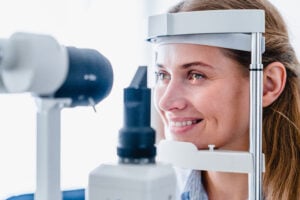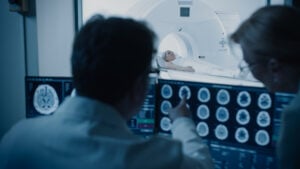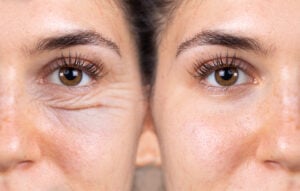The earlier it is found, the easier breast cancer is to treat. That’s why every three years, women over 50 in the UK are offered a mammogram (at least until they reach 71 years of age). That way, doctors can detect any abnormal changes in the breast.
In its simplest form, a mammogram can be described as an X-ray of the breast. The equipment is so advanced that it can detect a cancerous tumour only 4mm long. And, in many cases, that means before symptoms even begin to show. As a result, the treatment offered is more likely to be successful, and a mastectomy is less necessary.
According to official government statistics, mammograms save up to 1300 lives a year.
Latest techniques for breast screening
As the most common type of cancer in the UK, it should come as no surprise that new diagnostic therapies to diagnose breast cancer are constantly being developed. Some of the latest techniques include:
Digital Mammography (Tomosynthesis)
Also referred to as Digital Breast Tomosynthesis (DBT), digital mammography involves using X-ray technology to create a 3D image—rather than a 2D image—of the breast tissue. This is achieved by moving the X-ray tube around the breast area, allowing it to take multiple images from various angles. These are then combined in a computer to produce a three-dimensional image of the breast.
Breast MRI
Magnetic Resonance Imaging (MRI) involves radio waves and magnets to screen for breast cancer (rather than ionising radiation). A computer takes images of the inside of the breast, highlighting any abnormality and guides a needle to remove a tissue sample for biopsy. It’s sometimes used in conjunction with mammography for individuals with a family history of breast cancer or who have an inherited breast cancer gene, such as BRCA1 or BRCA2.
Breast Computer Aided Detection
Computer-aided detection (CAD) is used to read the mammograms of older women. This allows invasive breast cancer to be found before it has the opportunity to spread to other parts of the body. It can also detect ductal carcinoma in situ (DCIS), which isn’t invasive since it remains inside the milk duct.
Genetic Testing
The genes BRCA1 and BRCA2 can repair DNA damage and, when functioning normally, will help prevent cancer. Those born with an abnormality in either of these genes are likely to go on to develop cancer, including breast cancer. Individuals with Jewish ancestry are particularly susceptible. Testing is done via a saliva sample and checked under lab conditions.
Biomarker Testing
Circulating tumor DNA (ctDNA) is DNA released into the patient’s bloodstream when a cancer cell dies. Testing the blood for ctDNA is a potential new way of testing for breast cancer. But it can do far more, too. It can tell if the current cancer treatment is no longer working, determine whether a drug is likely to work, and even determine if cancer is present prior to a mammogram.
Other breast imaging tests include:
- Scintimammography (molecular breast imaging)
- Positron Emission Mammography
- Electrical Impedance Imaging
- Elastography
Leading UK private cancer centres offering advanced diagnostics
The London Clinic
The London Clinic is home to world-class cancer experts and is recognised as one of the most technologically advanced cancer research units in the world. Oncologists at The Duchess of Devonshire Wing are continually developing new treatments. The London Clinic provides a comprehensive breast care service for women worried about their breast health or who have developed breast cancer.
To make an appointment, get in touch by clicking here.
The Royal Marsden, London
Europe’s largest comprehensive cancer centre, the Royal Marsden Hospital in London, is another breakthrough cancer centre. It has sites in Chelsea and Sutton and a daycare unit in Kingston. Its Cavendish Square centre is an inner-city diagnostic and treatment centre.
The Christie, Manchester
Part of HCA Healthcare, the decade-old Christie Centre is equipped to treat complex and acute breast cancer patients. It is also linked to the Sarah Cannon Research Institute UK (SCRI UK), where new cancer trials are continually being developed both in the UK and Overseas.
Genesis Care, Birmingham
Specializing Genesis Care’s outpatient cancer centre in Birmingham specializes in advanced radiotherapy treatment. It is staffed with an expert team of radiotherapists and oncology consultants, and its state-of-the-art treatment methods are amongst the most advanced in the country.













